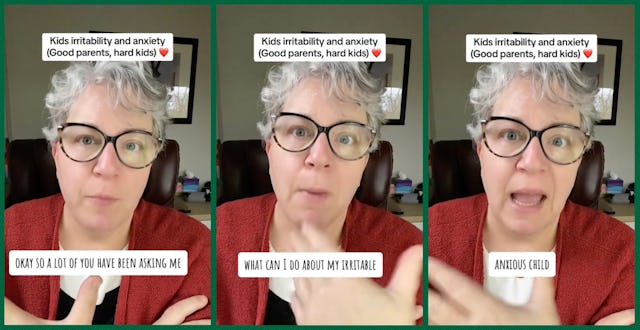A Therapist Has A PSA For Parents Of Kids With Big Feelings: You Cannot “Fix” This
It’s time to talk about coping skills.

When you have a sensitive kid, their anxiety or irritability can feel overwhelming — for them, obviously, but also for you. As a parent who loves them and wants the best for them, you might see your beautiful orchid child wilt under the weight of life and would do whatever you could to make it better. However, one therapist has an essential (but tough) message for parents whose natural inclination is to "fix" things.
“‘What can I do about my irritable, anxious child? How do I help them?’” Dawn Friedman, an education and child behavior expert, shares in a 2023 TikTok video now resurfacing on FYPs. “The most important thing I want you to know is you cannot fix this for them.”
There’s not much a good parent wouldn’t do for the kid, so being told that you can’t fix what is causing their anxiety or grief? Gutting. But Friedman explains why you can’t, and you shouldn’t, fix everything.
“Part of their growth as a human is learning how to operate as someone who is inclined to anxiety or irritability,” Friedman says. “There is no way that you can parent so well that your child will not struggle, that they will not suffer. What we’re trying to do as parents is help them build the coping skills and tools to tolerate growing, which can be painful.”
Don't worry, though: Friedman does have some actionable advice for you.
Start with acceptance.
Friedman suggests that, for some kids (even into adulthood), the most elemental obstacles in life will seem like a significant struggle. Every unfairness in the world will sit on their shoulders. And the best thing you can do as a parent is accept that and help them learn how to process their big feelings.
“Once we accept that about our child the way we would accept whether they’re left-handed or right-handed... Then it’s not ‘how do I fix it?’ It’s ‘How do I invite them to learn how to tolerate it, cope with it, and become exactly who they are meant to be?’”
Don't dismiss a spiral; validate it.
We've all spiraled at some point, so you know that it's not particularly helpful or welcome to hear someone tell you mid-spiral that you're overreacting or you need to calm down. You don’t want that for your parent-child relationship. Instead, Friedman recommends simply acknowledging that your kid is spiraling. “That sounds so easy to say, right? But, it’s really hard,” Friedman admits.
So, what tips does she offer? “One of the most important things you can do for a child is to be fully present for them and believe in their ability to grow. So, you say to them, ‘I know that things can feel especially hard for you. I know that you are very sensitive. I know this feels overwhelming.’ We validate it.”
As difficult as it is, resist the urge to make it all better.
What you don't want to do amid your kid's big feelings is "try to make it all better." While it's coming from a good place, your desire to “help them” not feel anxious or overwhelmed can read more like you're trying to change the very nature of who they are. It's the antithesis of accepting them and their big feelings, which we already know is the best thing you can do as a parent.
Tell them you believe in them.
According to Friedman, the most vital thing she does for her kids and clients is empower them: "We say, 'I know you are strong enough to hang in there. I know that you have the capacity to do those hard things. I believe in you.'"
Realize that you are also learning.
When asked in the comments of her video how parents can teach coping skills when they're still trying to learn them, Friedman responded with a gentle reminder.
"Most of us are learning them with our kids because kids are so triggering! I had no idea of my capacity for anger until I had kids," she said. "There is room for us all to grow, and we are demonstrating growth, which is powerful. Don't discount it! Imperfect parents are necessary because kids will be imperfect, too, and they need to learn self-forgiveness so we can demonstrate that, too."
Address your own discomfort.
Another gem from the comments section? One mom admitted her initial panicked "How can I fix this quickly?" reaction stemmed from how uncomfortable she found her kid's discomfort.
"I get this with clients sometimes!" said Friedman, continuing with a simple but critical piece of advice. "It's my sign to take a deep breath and take care of my discomfort. Otherwise, I often make a move that is not helpful."
Let them learn.
Friedman explains that people often expect both parents and therapists to “fix” issues, but that’s not what she believes her purpose or the purpose of parents is.
Just like letting your kids figure out how to entertain themselves or climb down on their own from a too-tall slide, it’s equally important to let them learn to ride their emotional waves.
It may be tempting to cut through your little one's big feelings by telling them, “You’re OK.” But that doesn’t change the fact that they don’t feel OK — and that, actually, is OK.